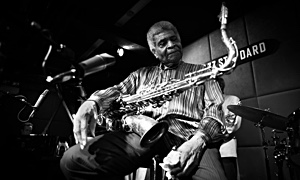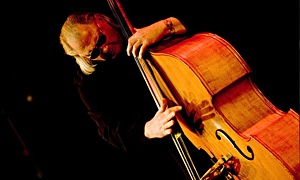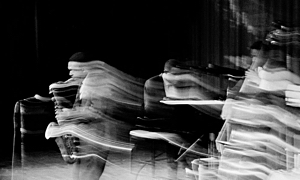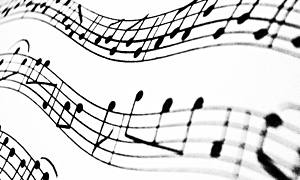Home » Jazz Articles » On and Off the Grid » Anthony and Me
Anthony and Me
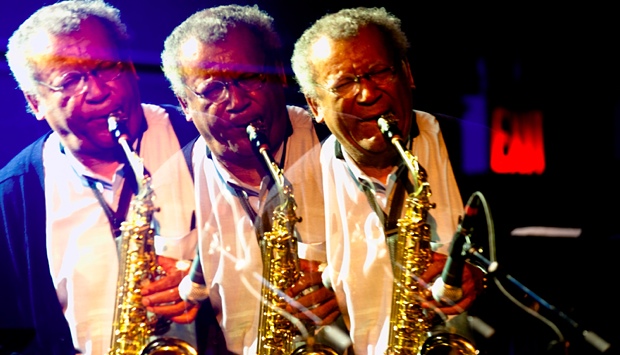
I decided that being a professional musician for more than fifty years, I could write about the things I care about, know about, have strong opinions about based on my own experiences that might be worth sharing. In no way do I want the reading public to think this is about self-promotion. For me this is an opportunity to share my life experiences and hopefully they might, in some small way, help to understand this crazy adventure we're in called "jazz."
It must have been sometime in the '70s that I first heard the name Anthony Braxton. I had no idea who he was except I heard he was really different and different appealed to me. Being married at the time with two small children, I didn't have extra money to spend on records or even listen to the radio that much, but the few times I did, I heard "Ornithology" from In The Tradition(Steeplechase, 1974), with Anthony Braxton (contrabass and clarinet), Tete Montoliu (piano), Niels-Henning Orsted Pedersen (double bass) and Albert Tootie Heath (drums), and it was an awe-inspiring record, as was Five Easy Pieces (Arista, 1975). I immediately understood the direction he was going and it was a place to which I also wanted to go.
Many years passed. In fact, thirty years went by. By then I had recorded for Blue Note and, by the 1980s, I felt I was on my way to getting to the musical place I am today. It took hard work and I didn't play that way on gigs. I only played "out" at rehearsals with my then trio—Mitchell May on bass and Tony Lupo on drums. In the late eighties I met bassist Dominic Duval. Dominic wanted to go to the same place I did. We hit it off right away. We formed a trio but never worked. We did record for the fun of it. I had written a tune called "In A Quarter Tone," based on Duke Ellington's "In A Mellow Tone." I used an acoustic guitar with light strings so I could bend and make the quarter tones happen. For another free form piece I used the same guitar, but I put a rubber ball and some nails inside the hole. Obviously it was an old, beat-up guitar.
Without ever listening to the "God" of avant-garde guitar, Derek Bailey, I started experimenting early on. I just did not have a discography to trace my growth. I was also afraid to let loose in those days. It was hard enough making a living as a musician, but an avant-garde jazz musician? No way. If I wasn't married with children I would have gone that route, but fate had other plans for me.
After playing with Dominic for a while, we both went our separate ways. Years later I got a call to play with a small big band. To my surprise Dominic Duval was the bassist and Jay Rosen was the drummer. Through that meeting, Dominic brought me in to some of the groups he played with and introduced me to many of the musicians I play with now, such as Jay Rosen, Michael Jefry Stevens, Mark Whitecage, Tomas Ulrich and Blaise Siwula.
When I started to play with these, and many more musicians like these, I decided to "come out of the closet," so-to-speak, and finally play the way I wanted. I credit Dominic Duval, Jay Rosen and Blaise Siwula, who understood what I was about and encouraged me, but it was Jay who nagged the hell out of me to submit a demo to Bob Rusch of CIMP Records. I was reluctant because of my experience with recording companies—and, besides, I was very happy teaching Literacy Through Songwriting Workshops for the Board of Ed in New York City. At the same time, Blaise Siwula submitted to CIMP, and in February, 1999, I recorded Finishing Touches with Jay Rosen and Mike Bocchicchio and the following week, Blaise, John Bollinger and I recorded Dialing Privileges. Before you know it, I was back in it.
When do I write about Braxton? Now!
After forming my own independent label in 2001 (CDM Records) and recording what I wanted, I still didn't let totally loose till The Vampire's Revenge in 2006. With that record, I felt I had established myself as an avant-garde player and composer.
The recording engineer on most of my recordings is Jon Rosenberg. While at the studio one day and listening to a playback, Jon said he would like to hear me with Anthony Braxton. I was taken off guard by that remark because only a few days before I listened to Anthony on WKCR radio, while driving, and my thought was, "I would really like to play with him." I told John, "I'd love to play with Anthony, but I don't know him and I doubt if he knows me." Jon responded, "Believe me, he knows who you are. I'll talk to him." "What do you mean you'll talk to him?" John replied, "I do all his recordings." "Really?" "Yes."
A few weeks later, Jon called and said that Anthony was interested and I should send him some CDs. Very happily and excited I immediately sent him Takin' The Duke Out, Goin' Out Again and The Vampire's Revenge. A year went by and I hadn't heard anything. I emailed Jon and he said that Anthony was going to be performing and recording at the Iridium (New York) in a few weeks. He suggested I go there and introduce myself and talk to Anthony.

I did just that. Anthony was so gracious and welcoming. He told me he listened to my work and couldn't wait to record. I went home very excited, knowing that in a very short time I would be recording with one of the greats in the avant-garde world.
Two years later I still hadn't heard anything. I called Jon and he said he would remind Anthony. In the summer of 2010 Anthony was performing and recording for four days in a performance space in Brooklyn. I went to see him. He was happy to see me. We decided then we would record after New Year's, 2011. In January, 2011 the three of us started emailing back and forth till we decided on March 12th and13th, and everything was set in motion.
The morning of March 12th I met Jon at Grand Central Station. We took the train to Hartford, CT, and a cab to the hotel. Anthony picked us up and brought us to the concert hall at Wesleyan College where we would record. The auditorium is large; it seats about five hundred people and is mostly made of cinder blocks except for the stage. We set up. For me it was simple. All I needed was one amp, a digital reverb pedal and two chairs: one chair to sit on and the other to place my picks and a small towel on. I usually go through 4 to 10 picks in an hour set. I also placed a pack of gum, not to chew but to use as my 'special effect.' At times I take the hard gum casing to slide over the strings. In the last ten years, the only effects I use are the ones I can get naturally out of the guitar or anything that happens to be near me, like paper or a bottle. Anthony set up facing me about eight feet away with his various reeds in front and back of him. After the sound check we were ready to go.
Anthony took out this gigantic hourglass filled with sand, turned it over, put the alto sax in his mouth and we began.
From the very first note we were in sync. I just closed my eyes, listened to these wonderful lines Anthony played and I responded in kind. We played for an hour straight, never stopping. The only time Anthony stopped was to switch to another reed. The only time I stopped was to change picks and I could only do it when Anthony played solo for a few seconds. Playing for an hour straight is not only difficult, it can be physically and spiritually demanding. In the last few years I started playing sets that were an hour long non-stop, but it was always with a group of musicians, which is easier because you take short breaks while the other musicians play. But playing duo non-stop is very challenging because you want it to be musical while keeping the energy going.
I was surprised how fast an hour could go by, but it did. I very rarely opened my eyes. The few times I did it were only because I did not hear any sounds coming from Anthony's side. Then I knew I had to solo while he switched reeds. After the last note was played we both laid back for the silence to take over and then we smiled and hugged each other. The music was more than I hoped for and Anthony was so joyous and kept telling me how much he loved my playing—so much so that I got a little embarrassed. Here was this musical genius praising me. It was overwhelming, to say the least. We took an hour break. I just sat back and relaxed in the comfort of the music that was still surrounding my aura.
An hour later, we did it again. The hardest part about playing two one-hour sets of free-form duets is trying not to repeat yourself. You must live in the moment and let your creative instincts take over. It is a marriage with a give-and-take and leaving your ego at the door, because your prime concern is the music, not yourself.
When we finished we were exhausted. Anthony took us back to the hotel and graciously treated us to dinner. This is where I got to know him and enjoy him.
Anthony is such a good guy. That night he was joyful, and happy. At dinner we laughed and had a good time together. We talked about our favorite science fiction movies and TV shows and musicians we knew and admired and our favorite recordings. I was surprised how much alike we are.
The next day after meeting Jon for breakfast. Anthony picked us up and off we went. We followed the same procedure as the day before and started recording around 12 PM. I was amazed. Could this possibly be better than yesterday? The truth is, that when I'm in it, the only thing I can think, feel and hear is the music. But it felt great. Again an hour break and we resumed recording. At the end of the very last note, I was both exhilarated and exhausted. Anthony was too. How many times in a musical career are there experiences like this?
Anthony drove us to the train station. We profusely thanked each other and said goodbye. On the way home Jon and I hardly spoke. I was thrilled and sleepy. I thanked Jon for giving me one of greatest experiences of my life. Jon said he would send me the unmixed CDs but he got so much into it, he mixed and mastered all four in a month.
Four hours is a lot of music to listen to. I couldn't do that in one sitting. I listened to each one, one at a time, over a three-week period. I was thrilled that Jon got my sound and his mastering was great! Anthony felt the same way. We were like kids with a new toy. How do you explain this to a layman? It's impossible. The thousands of hours we spend practicing and developing we could have been brain surgeons a hundred times over, but there is nothing like the feeling of accomplishing and baring your soul and being proud of it.
Now, a year later, the Russian Solyd label has picked up the recording. They plan to release two records at a time. The first double-disc set will be out later this year and the next set will come out about a year later.
There is so much in my life that I am grateful for and this is on the top of my list. One thing I know for sure, I have a new friend for life and that is something!
Photo Credits
Page 1, Anthony Braxton: Courtesy of Anthony Braxton
Page 2, Dom Minasi: Scott Friedlander
< Previous
Little Played Little Bird
Comments
About Anthony Braxton
Instrument: Woodwinds
Related Articles | Concerts | Albums | Photos | Similar ToTags
anthony braxton
On and Off the Grid
Dom Minasi
United States
Tete Montoliu
Niels-Henning Ørsted Pedersen
Albert "Tootie" Heath
dominic duval
duke ellington
Derek Bailey
Jay Rosen
Michael Jefry Stevens
Mark Whitecage
Tomas Ulrich
Blaise Siwula
John Bollinger
For the Love of Jazz
 All About Jazz has been a pillar of jazz since 1995, championing it as an art form and, more importantly, supporting the musicians who create it. Our enduring commitment has made "AAJ" one of the most culturally important websites of its kind, read by hundreds of thousands of fans, musicians and industry figures every month.
All About Jazz has been a pillar of jazz since 1995, championing it as an art form and, more importantly, supporting the musicians who create it. Our enduring commitment has made "AAJ" one of the most culturally important websites of its kind, read by hundreds of thousands of fans, musicians and industry figures every month.






